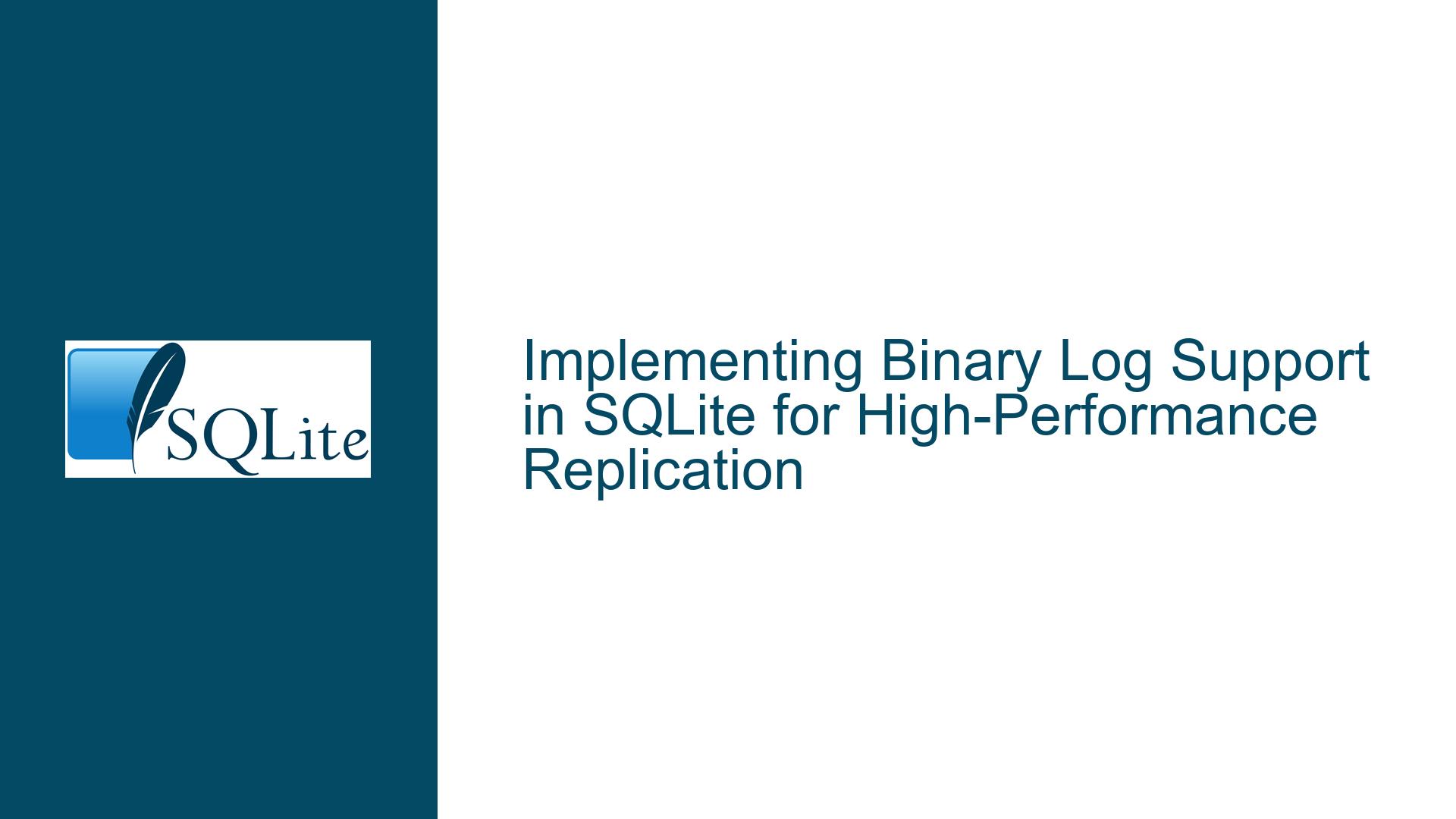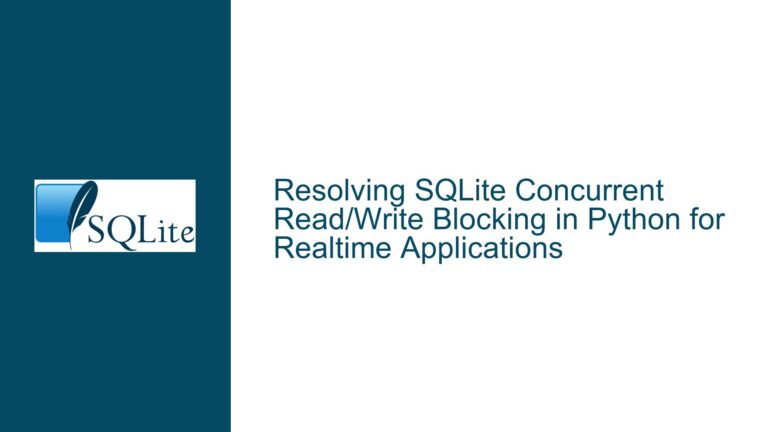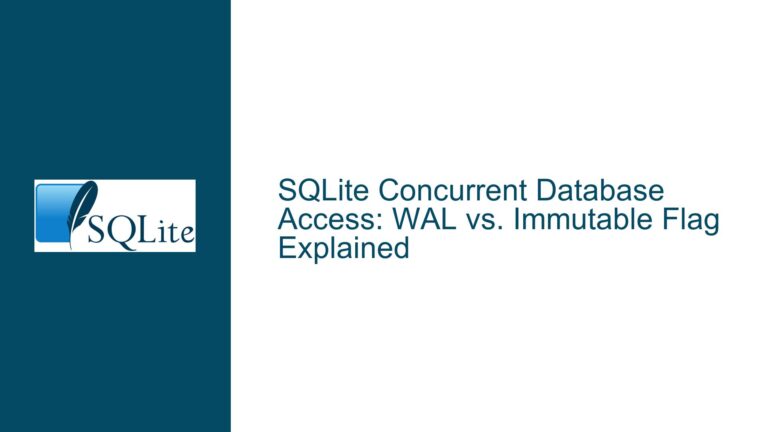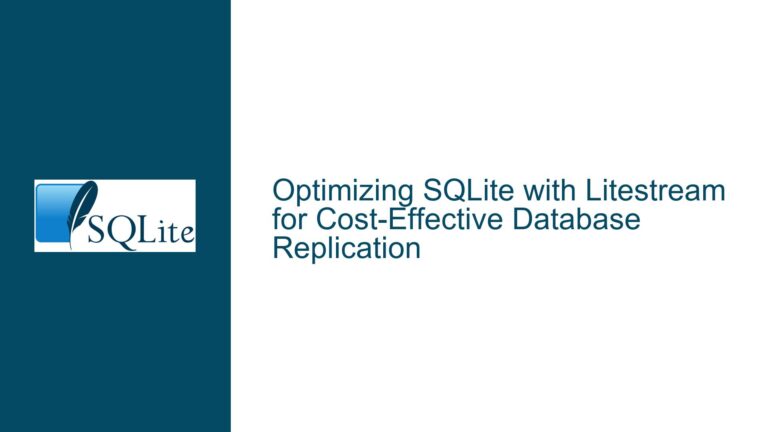Implementing Binary Log Support in SQLite for High-Performance Replication
Understanding the Need for Binary Log Support in SQLite
SQLite is renowned for its lightweight, serverless architecture, making it a popular choice for embedded systems, mobile applications, and scenarios where simplicity and portability are paramount. However, one of the limitations of SQLite is its lack of native support for replication and high-availability features, which are often required in distributed systems. This is where the concept of binary log support comes into play.
Binary logs are a common feature in database systems like MySQL, where they record all changes made to the database in a binary format. These logs can then be replayed on a secondary (slave) instance to achieve replication, ensuring that the slave database remains in sync with the master. The original poster (OP) in the discussion is exploring the feasibility of implementing a similar binary log mechanism in SQLite to enable high-performance replication, persistence, and other advanced features such as audit logging and time travel.
The OP’s primary motivation is to leverage SQLite’s high performance in memory database mode, which can handle up to 100,000 write transactions per second. However, when using exclusive locks for concurrent read/write transactions, the performance drops significantly to around 10,000 transactions per second. By introducing binary log support, the OP aims to bypass the need for exclusive locks during checkpoints, thereby maintaining high performance while ensuring data persistence and replication.
Challenges and Limitations of Existing Solutions
The OP has already explored several existing solutions and extensions, such as the SQLite session extension, Litestream, BedrockDB, and rqlite, but found them unsuitable for their specific use case. The session extension, for instance, is designed for logging transactions in batches and only works with primary keys, making it inadequate for handling schema changes or providing fine-grained replication. Litestream, while capable of replicating SQLite changes to other servers, relies on cross-process locks, which result in poor performance compared to in-memory databases or lock-free modes.
BedrockDB and rqlite, two distributed SQLite variants, were also considered but rejected due to their limitations. BedrockDB is a heavyweight solution that relies on NVMe SSD RAID and memory-mapped files, making it unsuitable for lightweight or cross-platform applications. Rqlite, on the other hand, is not a library solution and requires the use of RESTful APIs, which introduces additional overhead and complexity.
Given these limitations, the OP proposes a custom implementation of binary log support in SQLite, which would allow for high-performance replication, persistence, and other advanced features without the drawbacks of existing solutions.
Proposed Implementation of Binary Log Support in SQLite
The OP outlines a detailed plan for implementing binary log support in SQLite, which involves the following steps:
Creating a Binary Log Entity Object: When a write transaction is initiated, a binary log entity object is created to store the SQL statements and bind values associated with the transaction. This object will serve as a container for all the changes made during the transaction.
Logging SQL Statements and Bind Values: For each
sqlite3_stepcall made by the user code, the corresponding SQL statement and bind values are saved into the binary log entity object. To optimize storage, duplicate SQL statements and values are checked and saved as references rather than being duplicated.Serializing and Storing the Binary Log Entity: When the write transaction is committed, the binary log entity object is serialized and stored in a memory block. This serialized log can then be replayed on a secondary database instance to replicate the changes.
Adding Changed Page Hashes for Integrity: To ensure the integrity of the binary log, the OP suggests adding a hash of the changed pages to the log entity. This hash can be used to verify that the changes have been applied correctly when replaying the log on a secondary instance. Additionally, a hash chain can be maintained to ensure the correct order of log entities.
Replaying the Binary Log: To replay the binary log on a secondary database instance, the hash of the changed pages is first compared to ensure consistency. The SQL statements are then executed in order, with the bind values applied as necessary. Before each
sqlite3_stepcall, the SQL statement is initialized if it hasn’t been already, and the bind values are applied. The changed page hash is compared again after each step to ensure that the changes have been applied correctly.
Feasibility and Potential Challenges
The OP’s proposed implementation of binary log support in SQLite is theoretically feasible, but it comes with several challenges and considerations:
Performance Overhead: While the OP aims to improve performance by avoiding exclusive locks during checkpoints, the process of creating, serializing, and storing binary log entities could introduce its own performance overhead. The impact of this overhead would need to be carefully measured and optimized to ensure that the benefits of binary log support outweigh the costs.
Handling Non-Deterministic SQL Functions: The OP mentions that the binary log should throw an error if the SQL includes non-deterministic functions like
RANDOM()orDATE(), as these could produce different results when replayed on a secondary instance. Handling such cases would require careful validation of SQL statements before they are logged, which could add complexity to the implementation.Schema Changes: The OP notes that the session extension is not suitable for handling schema changes, and the same limitation could apply to the proposed binary log implementation. Supporting schema changes would require additional logic to ensure that the binary log remains consistent with the schema of the secondary database instance.
Concurrency and Thread Safety: The OP’s plan involves using binary logs in a multi-threaded environment, which raises concerns about concurrency and thread safety. Ensuring that the binary log entities are created, serialized, and replayed in a thread-safe manner would be critical to the success of the implementation.
Persistence and Durability: While the OP’s primary focus is on in-memory databases, the binary log would also need to provide persistence and durability to ensure that data is not lost in the event of a crash. This would require careful management of the serialized log data, including writing it to disk or another persistent storage medium.
Alternative Approaches and Considerations
Given the challenges associated with implementing binary log support in SQLite, it is worth considering alternative approaches that could achieve similar goals with less complexity:
Using Existing Replication Solutions: While the OP has rejected solutions like Litestream, BedrockDB, and rqlite, it may be worth revisiting these options to see if they can be adapted or extended to meet the specific requirements. For example, Litestream could be modified to reduce the performance overhead associated with cross-process locks, or rqlite could be enhanced to provide a library-based interface.
Leveraging SQLite’s WAL Mode: SQLite’s Write-Ahead Logging (WAL) mode provides some of the benefits of binary logs, such as improved concurrency and performance. While WAL mode does not provide replication, it could be used in conjunction with other techniques to achieve similar results. For example, the WAL file could be periodically copied to a secondary instance and replayed to achieve replication.
Custom Replication Logic: Instead of implementing binary log support directly in SQLite, the OP could develop custom replication logic that captures changes at the application level and propagates them to secondary instances. This approach would provide greater flexibility and control over the replication process, but it would also require more development effort and could introduce additional complexity.
Exploring Other Database Systems: If the requirements for high-performance replication and persistence cannot be met with SQLite, it may be worth considering other database systems that natively support these features. For example, PostgreSQL with its built-in replication and logical decoding capabilities could be a suitable alternative, depending on the specific use case.
Conclusion
The OP’s proposal to implement binary log support in SQLite is an ambitious and potentially valuable endeavor, particularly for applications that require high-performance replication and persistence. However, the implementation comes with significant challenges, including performance overhead, handling non-deterministic SQL functions, supporting schema changes, ensuring thread safety, and providing persistence and durability.
Before proceeding with the implementation, it is essential to carefully evaluate the feasibility of the proposed solution and consider alternative approaches that may achieve similar goals with less complexity. Additionally, thorough testing and benchmarking would be required to ensure that the binary log support meets the performance and reliability requirements of the target application.
Ultimately, the decision to implement binary log support in SQLite will depend on the specific needs and constraints of the application, as well as the resources available for development and maintenance. If successful, this feature could significantly enhance the capabilities of SQLite, making it a more viable option for a wider range of use cases.






